|
|
|
..
Dear Friends,
Thank you for all of your care and support and thanks again for the outpouring of support for Shining Moon, the relief team leader who recently passed away. That was very touching for us. Thank you very much.
Report Summary:
The following is an update on the ongoing attacks on the Karen people in the mountains northeast of the cyclone-affected area as well as an update on the cyclone and ongoing relief efforts.
The Burma Army is attacking, burning villages, laying landmines and displacing people in eastern Burma. These attacks are part of an ongoing operation to completely dominate and control the ethnic peoples of Burma. This report contains photos and information sent by relief teams helping people who are under attack now. Thank you for your assistance to the over 40 FBR relief teams bringing help, hope and love to attacked and displaced people in the war zones of Burma.
Burma’s dictators also continue to obstruct aid to cyclone victims as they continue the attacks against ethnic minorities in Eastern Burma.
This is a two-part report, first on the attacks taking place now, second an update on cyclone relief.
Thank you for all of you who are helping the victims of the cyclone, the victims of these direct attacks and all of the people of Burma who are victims of the oppressive regime.
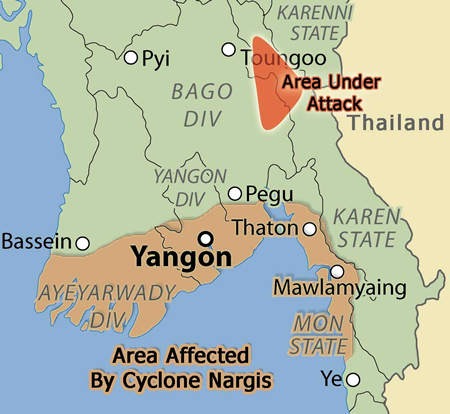 |
|
Nyaunglebin District, Karen State: Burma Army burns down Mae Li Ki village, forces villagers to vote yes in the referendum and to donate to Burma Army for cyclone relief. |
Photos:
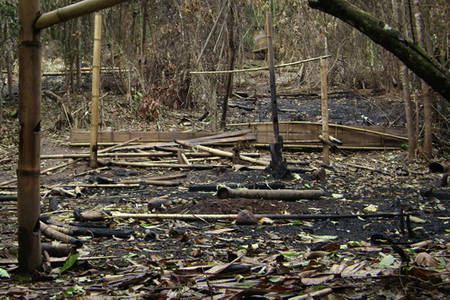 |
| Mae Li Ki village burned down by Burma Army on 10 May 2008. FBR Photo |
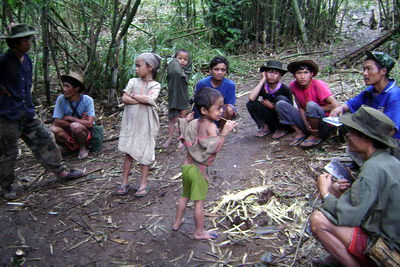 |
| People displaced by attacking Burma Army. May 2008. FBR Photo |
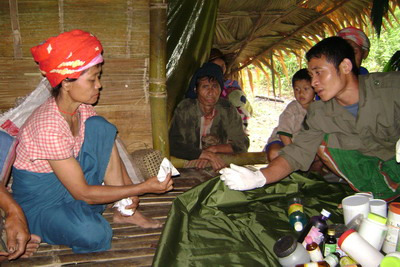 |
| FBR relief team giving medical help to Mae Li Ki IDPs. May 2008. FBR Photo |
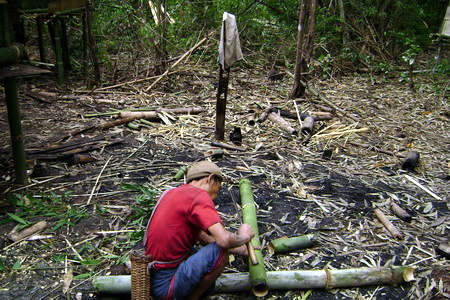 |
| IDPs rebuild homes in Mae Li Ki village. May 2008. FBR Photo |
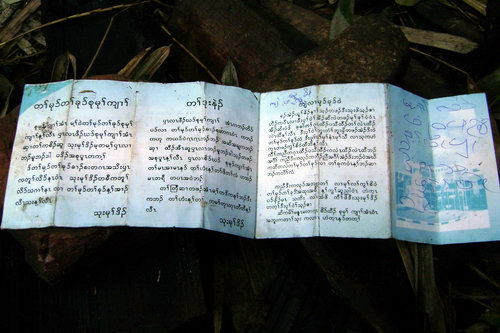 |
| Burma Army left brochures about peace in Mae Li Ki village after burning the village down. FBR Photo |
Kyauk Kyi Township: Burma Army burns down one village, calls 270 people to do forced labor and forces villagers to vote Yes in the referendum.
Burma Army troops burned down Mae Li Ki village on 10 May 2008. Sixteen families (over 80 people total) live in Mae Li Ki village. The Burma Army troops attempted to burn the entire village, but because of rain only 11 houses were completely destroyed. 83 sacks of paddy and 3 sacks of rice were burned and the Burma Army troops ate 4 large pigs and 166 chickens. The troop stole all of the villagers belongings. After burning the village, the Burma Army troops, IB 241 from MOC 16, left brochures talking about peace in the village.
The villagers returned to their burned homes from their hiding places and rebuilt the houses after the Burma army left. However, the Burma Army returned so the villagers were forced to flee to another location and hide again.
5 May 2008.
Burma Army Div 101 commander Maung Maung Oo ordered forced porters from the following villages to carry loads and work for the army: 120 people from P’Deh Gone, 50 from Ma Pee , and 100 from Baw Ga Ta. It is uncertain where he will force those 270 people to go or what work they will do.
10 May 2008.
The Div 101 commander held a meeting and gathered P’Deh Gone, and Ba Ga Ta village tracts and forced the entire population of villagers age 18 and older to vote yes in the referendum voting on 10 May 2008.
Mon Township: 500 villagers flee attacks and are in hiding. Other villagers are forced to give money that the Burma Army told them will help victims of Cyclone Nargis.
27 May 2008
Over 500 villagers are driven into the jungle by attacking Burma Army troops in eastern Mon township. The villagers are still in hiding.
25 May 2008.
Burma Army Battalion Commander Ko Ko Oo from LIB 590 demanded a total of 2,150,000 Kyat from 5 village tracts in Mon Township. According to the demand, the money was needed to help the victims of Nargis in Rangoon and Irrawaddy Division.
The village tracts are:
Lay Tain Daw — 350,000 Kyat
Tee Dto Lo — 700,000 Kyat
Aung Chan Tha– 350,000 Kyat
Paw Bpi Der — 400,000 Kyat
Myaung Oo — 350,000 Kyat
4 May 2008.
Burma Army LIB 590 captured one Poe Thaw Suu villager name Saw Xx and demanded 200,000 Kyat from him without any stated reason. On the same day Burma Army troops captured Saw XX from Ter Paut village. At the time of this report the men were still being held by the Burma Army.
Toungoo District, Karen State: Burma Army burns farms, lays landmines in villages, forces villagers to build fences around villages and army camps and to carry army rations
3 May 2008. Woman steps on Burma Army landmine.
-Burma Army Military Operation Command (MOC) 10, Tactical Operation Command (TOC) 3, Light Infantry Battalion (LIB) 364 column entered in Sho Ko village and planted landmines there to terrorize returning villagers. Naw Baw U, a 26-year-old woman from Maw Bwe Ko village, stepped on the Burma Army land mine in Sho Ko village.
-SPDC commander instructed a group of villages near Thandaung to send their list of houses with registrations and the SPDC would vote yes for those in the households in the referendum.
-Burma Army MOC(21) forced Play Hsar Lo villagers (1 woman and 3 men), Yaw Lo villagers (1 woman and 3 men) and Plaw Baw Der villagers (3 women and 3 men) to carry army rations from Play Hsar Lo camp to Ga Mu Lo. Villagers in that area are having difficulty having enough money to buy food. Villagers report more attacks by the Burma Army in Thandaung Township.
7 May 2008. Forced labor
Burma Army LIB(439) staying in Shazibo and forced the four Shazibo area villages to build fences around their villages and when complete, to build a fence around the army camps. The same day the Burma Army forced Play Hsar Lo villagers (6 women and 3 men), Plaw Baw Der villagers (3 women) to carry the army rations from Play Hsar Lo to Ga Mu Lo.
11 May 2008. Firing on villagers and burning orchards.
Burma Army MOC 10 shot mortars at Koe Haw Der and Thay Mu Der villagers from Maw Koe Der. The Burma Army column burned down the villagers’ beetle nut trees and cardamon farms.
12 May 2008. forced labor
Burma Army MOC 21 in Play Hsar Lo forced Play Hsar Lo villagers (12 women and 22 men), Paw Pa villagers (7 men and 5 women), Yaw Lo villagers (5 men and 5 women) and Plaw Baw Der villagers (2 men and 4 women) to carry army rations from Play Hsar Lo camp to a new Burma army camp in Htee Blar Dai.
13 May 2008. Forced labor
Burma Army MOC 10 TOC 2 in Ker Wei forced 12 Khu Thay Der villagers, 10 Sa Ba Law Kee villagers, 10 Khaung Law Ka villagers, 10 Der Ka villagers and 10 Ler Ghee Ko villagers to carry army rations from Thaundaung city to Ker Wei army camp.
CYCLONE UPDATE:
The death toll of the cyclone has now passed 130,000 people while over 2 million are displaced. The greatest needs are drinking water, food, shelter and medicine. While the SPDC is under pressure to stop obstructing the relief efforts and while there are some signs that larger scale relief efforts may become possible the need still far outweighs the relief getting to the victims. A majority of the people have not received significant assistance.
Good News:
In spite of these obstacles individuals, churches and relief organizations in the affected area are getting relief supplies to some of the people in need. The local networks we are in partnership with have been able to find ways to distribute immediate assistance.
I) Report from a local partner providing relief in the cyclone affected area:
“Thank you all around the world that pray for and help our people. We recently returned from a relief mission into the cyclone area. We were able to distribute the support you gave us to people in need. We split our relief team up into four groups: medical care group, counseling group, singing group and material relief group. We made it to four of the main affected townships and helped people until we were out of supplies. We will go back in again. Thank you for your help and God bless you.” A Delta Network Relief Team Leader.
II) Report from Partners Relief and Development:
This is a report from a Partners Relief And Development (PRAD) staff member who recently returned from the affected area:
“1. The team on the ground there- both our people and those we are partnering with- are doing an outstanding job…I came away really impressed and grateful for the organization, passion and sacrifice that I saw. Please continue to pray for them…there’s still very little electricity.
2. For the most part, still no foreigners are allowed into the Delta region, with a few exceptions. The nationals there are doing a great job of coordinating on a pretty large scale.
3. One of our staff was able to connect with the network in the south and was able to provide more funds, equipment, and relief materials. This aspect of the relief effort appears to be expanding.
4. As of now, it has become difficult to get visas the way several of us recently received them and none of us are very optimistic about the announcement regarding “letting all aid workers of any nationality in” that we all heard about over the weekend.
5. Please pray for the work on the ground there…it is pretty overwhelming but everyone I encountered was persevering. It was a blessing to see all of this.”
III) Letter from a Shan pro-democracy leader:
People all over Burma are trying to help the cyclone victims. Here is a letter from a Shan pro-democracy leader who sent assistance to the victims
“We are sorry and horrified by the news; the Cyclone Nargis in the Irrawaddy Delta killed thousands of people, including children. Amongst the deaths were other national ethnicities (in addition to Burmans), such as; Karen, Karenni and Shan. We heartedly sympathize with the remaining people and are donating cash assistance as a part of helping the refugees.
It is a big regret and a shame that the SPDC refused UN assistance for so long. The SPDC regime is showing its true colors and has clearly demonstrated that they do not value humanitarian needs and the importance of human dignity.”
Sao Yawd Serk
Chairman
Restoration Council of Shan State (RCSS)
Bad News
I) Information Received from network of local partners in the cyclone-affected area:
The following is information we are receiving from our network of local partners in the cyclone-affected area. We and PRAD are working together to support their relief efforts.
1) On 25 May Burma Army troops from Division 66 killed 2 villagers in Thit Pote village, Laputta Township for no reason. On 26 May Burma Army troops killed one villager in the Yaytwinchaung village for no reason.
2) Last week many people from Bogalay were forced to go to camps at M’ubin, Myawmya area. Today these same people were forced to go back to Bogalay so that the UN group visiting would see them back in their home area.
3) Most people do not want to go to the SPDC controlled camps but they are forced to go. There are also camps supported by church groups that people do want to go to. The SPDC has told the church groups that they must send a percentage of their people to the SPDC camps.
4) The SPDC has designated parts of the cyclone affected area as ‘black or no go areas’. People will be punished if found there. People must come to the relocation camps run by the SPDC.
5) Those in the worst conditions and in the most need are those living on small islands. They are cut off from most assistance.
6) There are still dead bodies are flowing in and out with the tides.
7) Dead= more than 130,000. Displaced= over 2 million.
8) Many people reportedly died this last week in Wakama Township due to sickness.
9) There was a demonstration and clash at No 3 High School refugee camp at Pathein as SPDC forced the cyclone survivors to return to their village. Soldiers forced refugees at gun point to board the truck.
10) The dictators attempted to force victims in the cyclone-affected area to vote ‘yes’ for the national referendum that supports the dictators. The USDA (Union of Solidarity and Development Association) which is a civilian wing of the dictatorship, threatened violence or to cut relief supplies to anyone that voted ‘no’.
II) Interview from a survivor of the cyclone: (PRAD)
The following is an interview from a survivor of the cyclone: (PRAD).
Survivor movement and relief camps
For the most part, Karen survivors had been left to fend for themselves with the local Karen Christian community arranging travel, also by boat, to a local Karen Bible college where locally provided aid and shelter could be given.
Aid
The Karen population were primarily receiving aid from those local villages least affected by the damage of the cyclone, even though those villages had also seen widespread destruction. Aid is primarily being provided by Karen elders and the Burmese authorities refuse to support those survivors unwilling to move into relief camps and will not provide direct aid to Karen leaders to support their communities.
International aid
At the time of traveling the interviewee did not directly see any international aid workers or local representatives in the area. The interviewee did note that he had personally seen international aid being sold in a Rangoon market.
Illness
Many people have begun to die from dysentery.
Death and burial
The interviewee reported that a large proportion of corpses continued to litter the delta area both in a heavily decomposed and more recently deceased state. Bodies could still be seen hanging in trees and the smell of death was ever present. The military had issued verbal orders that bodies were not to be buried and the interviewee recounted how his friend had asked the authorities permission to bury his deceased parents and had been refused. According to the interviewee, the military has made no effort to clear the area of corpses and villagers have taken to secretly burying their relatives when opportunity allows.
The Karen Situation
The situation for the Karen is particularly difficult with Karen Christian communities taking the burden of looking after survivors without aid from the government. The Burmese authorities have insisted that Karen survivors must move out of the area, relinquish their farms and not bury the dead. Although authorities have demanded the Karen move to relief camps local leaders have refused primarily believing that the situation will be worse in the camps and they will face further discrimination and abuse at the hands of the military. According to the interviewee many of the Karen in the areas he visited believed that the government will not provide aid to them with many of the people believing that the government had failed to help those areas worse hit than their own.
The interviewee had noted that the Karen in the area had already faced discrimination prior to the disaster especially in relation to travel and employment.
Humanitarian intervention
The interviewee believed that the majority of the Karen would support intervention on a humanitarian basis and would support such an effort.
–interview ends–
Thank you all again for your love, prayer and help. It makes a difference on the ground. It is lifesaving, gives hope and reminds people that they count and are loved.
God bless you,
The Free Burma Rangers
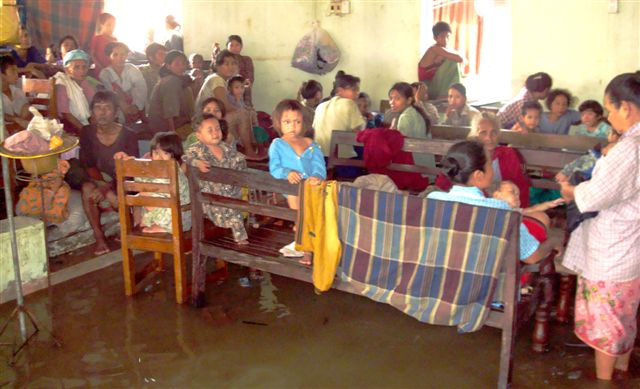 |
| Taking refuge in a church. May 2008. Photo by Delta Tears |
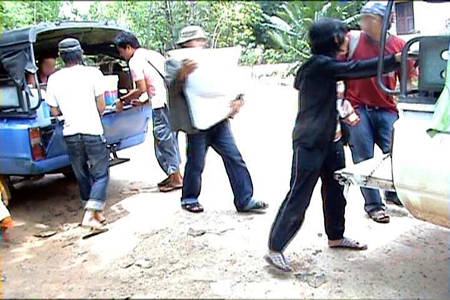 |
| Delivering Relief to Cyclone Victims. May 2008. Photo by Delta Network |
